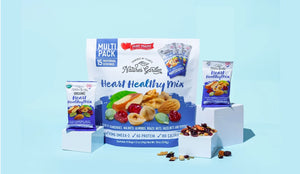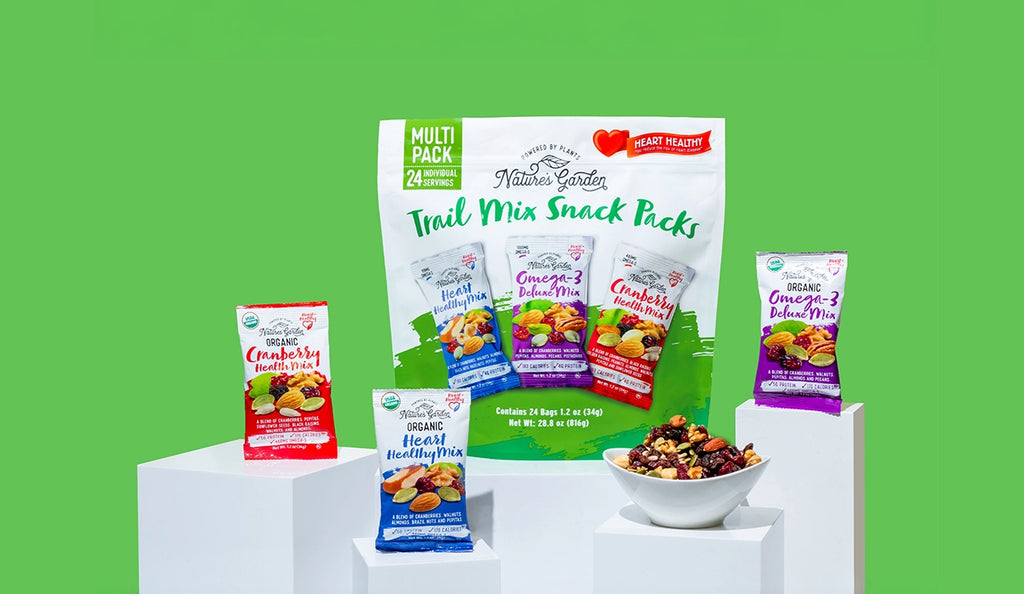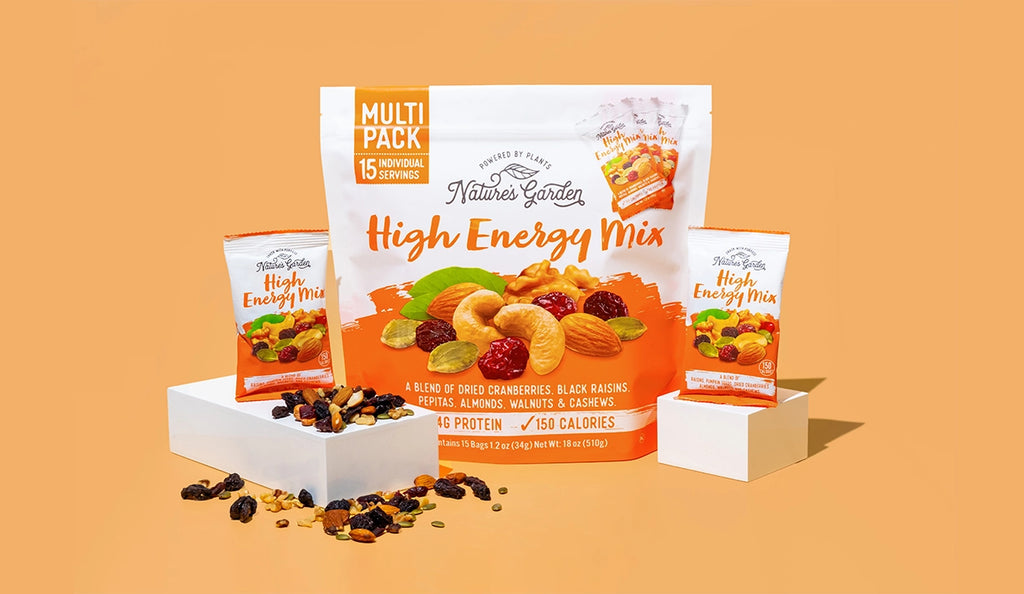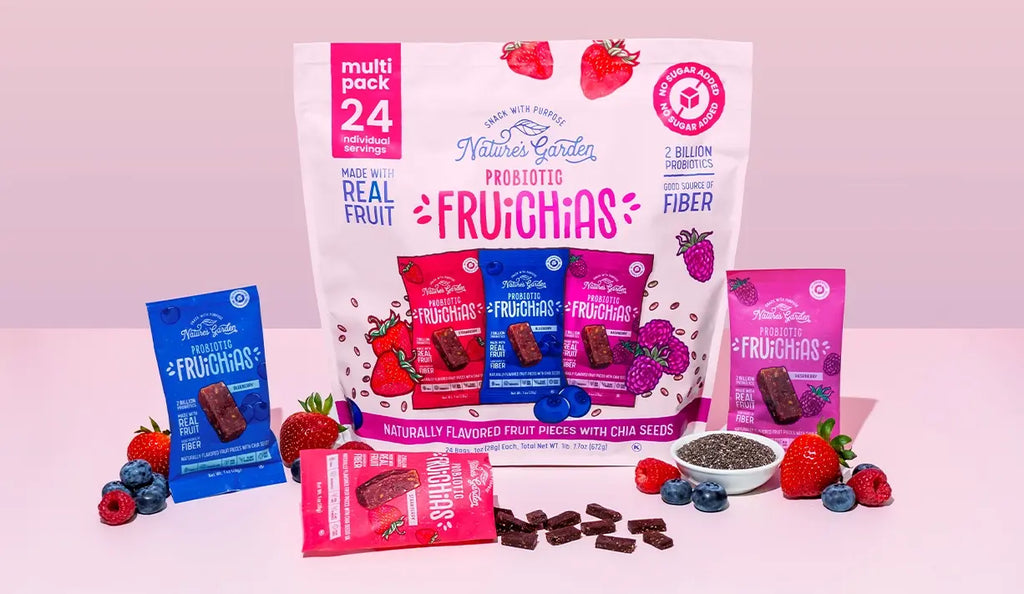In today’s world, conversations about nuts have been circulating in many different areas of health. With so many different types of nuts and varieties sold in the store, it might seem overwhelming to understand which ones may be most beneficial for your health. Additionally, there is concern around nuts being too high in calories, or too high in fat to incorporate to a diet if you are looking to lose weight. As with anything, each type of food is going to impact each individual in a different way. Lucky for you, there there are key insights from recent research studies that we are going to share with you today about nut consumption.
Here at Nature’s Garden, we have a variety of nut and trail mix snacks that include almonds, cashews, hazelnuts, pecans, pistachios, walnuts, peanuts, and even brazil nuts! Today, we are specifically going to emphasize the types of nuts that have been studied to have key benefits for heart health.
Why Nuts Are Good for Your Heart
Here are a few reasons why adding nuts on top of your oatmeal, or including a handful of nuts as an afternoon snack may be just another lifestyle change to improve your heart health.
Nuts Contain Bioactive Compounds
Nuts are nutrient-rich foods that contain many bioactive compounds that are beneficial for cardiovascular health. Higher consumption of nuts has been associated with a reduced risk of several cardiovascular diseases (CVD) in prospective cohort studies, including a 19% and 25% lower risk of CVD incidence and mortality, respectively, and a 24% and 27% lower risk of coronary heart disease incidence and mortality.
Nuts Improve Diet Quality
According to the Global Burden of Diseases (GBD) Study, unhealthy diets are the greatest contributor to premature morbidity and mortality worldwide, including CVD mortality. This includes diets low in whole grains, fruit, nuts/seeds, and vegetables.
A better diet quality that is more well-rounded with healthy fats, adequate protein, and fiber with few calories coming from added sugars, or processed foods creates a diet higher in beneficial vitamins and minerals that naturally improves heart health.
Nuts May Lower your CVD Risk
There are several mechanisms by which nuts can lower the risk of developing cardiovascular disease (CVD), such as through positively impacting cardiovascular risk factors such as cholesterol levels, blood pressure, glycemic control markers, and inflammation.
Nuts are known to have a good amount of the amino acid L-arginine, which is the substrate for the synthesis of endothelium-derived nitric oxide, the main endogenous vasodilator and blood pressure regulator. This is in part one explanation of how regular nut consumption can lower blood pressure. Nuts are also a rich source of beneficial minerals, such as calcium, magnesium, and potassium and low in sodium. Low sodium intake coupled with high intake of calcium, magnesium and potassium is associated with protection against hypertension, insulin resistance, and CVD.
Nuts May Help You Shed Extra Pounds
With the high fiber content, healthy unsaturated fat composition, and high polyphenolic activity in nuts, they have become one of the leading snacks to include for weight loss. There is consistent evidence from large prospective randomized controlled trials that have debunked the myth and concern of nuts leading to weight gain and obesity because of their high fat content. In fact, nuts have been found to help promote weight loss and reduce waist circumference, thereby decreasing one’s risk of cardiovascular disease. The high fat and fiber content of nuts increases the feeling of satiety and promotes fullness making it a great option if you are trying to curb those extra calories!
Nutritional Breakdown
Nuts are a good source of dietary fiber, ranging from 3 to 12.5 g per 100 g. Indeed, a standard 1-oz (28-g) serving of nuts provides 5–10% of daily fiber requirements.
Nuts are rich in unsaturated fatty acids, plant protein, phytosterols, fiber, and some minerals including potassium, calcium and magnesium.
Nuts are rich in vitamins (vitamin E and B6) and phenolic and bioactive compounds, all of which may contribute to their CV health-promoting benefits.
Specific nuts will be higher in some nutrients than others. Continue reading for a more detailed nutritional breakdown of the top 3 nuts for heart health.
Top Nuts for Heart Health
- Almonds (Per ¼ cup serving)
- Protein: 6g
- Fat: 14g
- Carbohydrate: 6g
- Nutrient Highlight: Vitamin E (7 mg; 44% Daily Value)
- Walnuts (Per ¼ cup serving)
- Protein: 4g
- Fat: 18g
- Carbohydrate: 4g
- Nutrient Highlight: Magnesium (59 mg; 15% Daily Value)
- Pistachios (Per ¼ cup serving)
- Protein: 6g
- Fat: 13g
- Carbohydrate: 8g
- Top nutrient: Potassium (250 mg; 7% Daily Value)
How to Add Heart-Healthy Nuts to Your Diet
Whether you like almonds, prefer pistachios, or even if you are a peanut fan - all nuts can be incorporated into your diet in different ways. Here are some ideas!
- Add ¼ cup of almonds to your morning oatmeal for some crunch
- Add 1 tbsp of chopped walnuts to some greek yogurt and berries
- Add ¼ cup chopped cashews to your post workout smoothie for creaminess and extra protein
- Add whole pistachios to a summer salad for a nice crunch and extra polyphenols
- Add chopped peanuts to a pad thai stir fry for your next meal prep dinner
Overall, eating nuts can be a great way to add more protein, healthy fats, and vitamins and minerals to your diet. Nuts can be particularly beneficial for individuals experiencing chronic health conditions such as high blood pressure, diabetes, and obesity as they contain key nutrients to help reduce blood pressure, stabilize blood sugar, and increase satiety levels to prevent overeating. Nuts come in many different types, flavors, and can easily be incorporated into anyone’s eating pattern.
Product Suggestion: Heart Healthy Mix
Looking for a snack to improve your heart health? Our Heart Healthy Mix is just what you need. With a mix of walnuts, almonds, hazelnuts, and brazil nuts, the polyphenol content is through the roof! Our healthy mix has no sodium, cholesterol, or trans fat and makes for the perfect addition to a summer salad or sweet breakfast bowl. So what are you waiting for? Go stock up on some Heart Healthy Mix in your household today - you won't regret it!

















